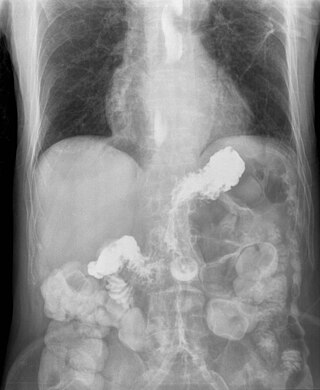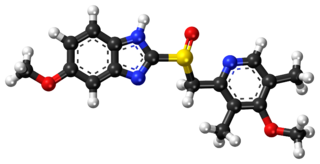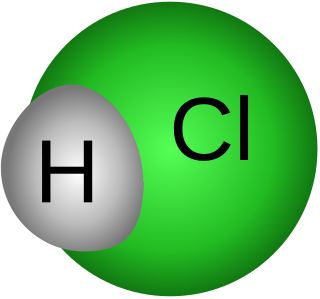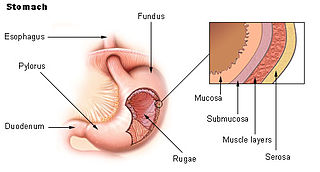Related Research Articles

Proton-pump inhibitors (PPIs) are a class of medications that cause a profound and prolonged reduction of stomach acid production. They do so by irreversibly inhibiting the stomach's H+/K+ ATPase proton pump.
Peptic ulcer disease is a break in the inner lining of the stomach, the first part of the small intestine, or sometimes the lower esophagus. An ulcer in the stomach is called a gastric ulcer, while one in the first part of the intestines is a duodenal ulcer. The most common symptoms of a duodenal ulcer are waking at night with upper abdominal pain, and upper abdominal pain that improves with eating. With a gastric ulcer, the pain may worsen with eating. The pain is often described as a burning or dull ache. Other symptoms include belching, vomiting, weight loss, or poor appetite. About a third of older people with peptic ulcers have no symptoms. Complications may include bleeding, perforation, and blockage of the stomach. Bleeding occurs in as many as 15% of cases.

Gastroesophageal reflux disease (GERD) or gastro-oesophageal reflux disease (GORD) is a chronic upper gastrointestinal disease in which stomach content persistently and regularly flows up into the esophagus, resulting in symptoms and/or complications. Symptoms include dental corrosion, dysphagia, heartburn, odynophagia, regurgitation, non-cardiac chest pain, extraesophageal symptoms such as chronic cough, hoarseness, reflux-induced laryngitis, or asthma. In the long term, and when not treated, complications such as esophagitis, esophageal stricture, and Barrett's esophagus may arise.

H2 antagonists, sometimes referred to as H2RAs and also called H2 blockers, are a class of medications that block the action of histamine at the histamine H2 receptors of the parietal cells in the stomach. This decreases the production of stomach acid. H2 antagonists can be used in the treatment of dyspepsia, peptic ulcers and gastroesophageal reflux disease. They have been surpassed by proton pump inhibitors (PPIs). The PPI omeprazole was found to be more effective at both healing and alleviating symptoms of ulcers and reflux oesophagitis than the H2 blockers ranitidine and cimetidine.

Omeprazole, sold under the brand names Prilosec and Losec, among others, is a medication used in the treatment of gastroesophageal reflux disease (GERD), peptic ulcer disease, and Zollinger–Ellison syndrome. It is also used to prevent upper gastrointestinal bleeding in people who are at high risk. Omeprazole is a proton-pump inhibitor (PPI) and its effectiveness is similar to that of other PPIs. It can be taken by mouth or by injection into a vein. It is also available in the fixed-dose combination medication omeprazole/sodium bicarbonate as Zegerid and as Konvomep.

Pantoprazole, sold under the brand name Protonix, among others, is a proton pump inhibitor used for the treatment of stomach ulcers, short-term treatment of erosive esophagitis due to gastroesophageal reflux disease (GERD), maintenance of healing of erosive esophagitis, and pathological hypersecretory conditions including Zollinger–Ellison syndrome. It may also be used along with other medications to eliminate Helicobacter pylori. Effectiveness is similar to other proton pump inhibitors (PPIs). It is available by mouth and by injection into a vein.

Famotidine, sold under the brand name Pepcid among others, is a histamine H2 receptor antagonist medication that decreases stomach acid production. It is used to treat peptic ulcer disease, gastroesophageal reflux disease, and Zollinger-Ellison syndrome. It is taken by mouth or by injection into a vein. It begins working within an hour.

Esomeprazole, sold under the brand name Nexium [or Neksium] among others, is a medication which reduces stomach acid. It is used to treat gastroesophageal reflux disease, peptic ulcer disease, and Zollinger–Ellison syndrome. Its effectiveness is similar to that of other proton pump inhibitors (PPIs). It is taken by mouth or injection into a vein.

Rabeprazole, sold under the brand name Aciphex, among others, is a medication that decreases stomach acid. It is used to treat peptic ulcer disease, gastroesophageal reflux disease, and excess stomach acid production such as in Zollinger–Ellison syndrome. It may also be used in combination with other medications to treat Helicobacter pylori. Effectiveness is similar to other proton pump inhibitors (PPIs). It is taken by mouth.

Achlorhydria and hypochlorhydria refer to states where the production of hydrochloric acid in gastric secretions of the stomach and other digestive organs is absent or low, respectively. It is associated with various other medical problems.

Ranitidine, sold under the brand name Zantac among others, is a medication used to decrease stomach acid production. It is commonly used in treatment of peptic ulcer disease, gastroesophageal reflux disease, and Zollinger–Ellison syndrome. It can be given by mouth, injection into a muscle, or injection into a vein. In September 2019, the probable carcinogen N-nitrosodimethylamine (NDMA) was discovered in ranitidine products from a number of manufacturers, resulting in recalls.

Nizatidine is a histamine H2 receptor antagonist that inhibits stomach acid production, and is commonly used in the treatment of peptic ulcer disease and gastroesophageal reflux disease.

Lansoprazole, sold under the brand name Prevacid among others, is a medication which reduces stomach acid. It is a proton pump inhibitor (PPI), used to treat peptic ulcer disease, gastroesophageal reflux disease, and Zollinger–Ellison syndrome. Its effectiveness is similar to that of other PPIs. It is taken by mouth. Onset is over a few hours and effects last up to a couple of days.
Gastric hydrogen potassium ATPase, also known as H+/K+ ATPase, is an enzyme which functions to acidify the stomach. It is a member of the P-type ATPases, also known as E1-E2 ATPases due to its two states.

Antihistamines are drugs which treat allergic rhinitis, common cold, influenza, and other allergies. Typically, people take antihistamines as an inexpensive, generic drug that can be bought without a prescription and provides relief from nasal congestion, sneezing, or hives caused by pollen, dust mites, or animal allergy with few side effects. Antihistamines are usually for short-term treatment. Chronic allergies increase the risk of health problems which antihistamines might not treat, including asthma, sinusitis, and lower respiratory tract infection. Consultation of a medical professional is recommended for those who intend to take antihistamines for longer-term use.

Troxipide is a drug used in the treatment of gastroesophageal reflux disease. Troxipide is a systemic non-antisecretory gastric cytoprotective agent with anti-ulcer, anti-inflammatory and mucus secreting properties irrespective of pH of stomach or duodenum. Troxipide is currently marketed in Japan (Aplace), China (Shuqi), South Korea (Defensa), and India (Troxip). It is used for the management of gastric ulcers, and amelioration of gastric mucosal lesions in acute gastritis and acute exacerbation of chronic gastritis.
Proton pump inhibitors (PPIs) block the gastric hydrogen potassium ATPase (H+/K+ ATPase) and inhibit gastric acid secretion. These drugs have emerged as the treatment of choice for acid-related diseases, including gastroesophageal reflux disease (GERD) and peptic ulcer disease. PPIs also can bind to other types of proton pumps such as those that occur in cancer cells and are finding applications in the reduction of cancer cell acid efflux and reduction of chemotherapy drug resistance.

Ilaprazole is a proton pump inhibitor (PPI) used in the treatment of dyspepsia, peptic ulcer disease (PUD), gastroesophageal reflux disease (GORD/GERD) and duodenal ulcer.
Sufotidine (INN, USAN, codenamed AH25352) is a long-acting competitive H2 receptor antagonist which was under development as an antiulcerant by Glaxo (now GlaxoSmithKline). It was planned to be a follow-up compound to ranitidine (Zantac). When taken in doses of 600 mg twice daily it induced virtually 24-hour gastric anacidity thus closely resembling the antisecretory effect of the proton pump inhibitor omeprazole. Its development was terminated in 1989 from phase III clinical trials based on the appearance of carcinoid tumors in long-term toxicity testing in rodents.

Acid peptic diseases, such as peptic ulcers, Zollinger-Ellison syndrome, and gastroesophageal reflux disease, are caused by distinct but overlapping pathogenic mechanisms involving acid effects on mucosal defense. Acid reflux damages the esophageal mucosa and may also cause laryngeal tissue injury, leading to the development of pulmonary symptoms.
References
- ↑ Eriksson S, Långström G, Rikner L, Carlsson R, Naesdal J. Omeprazole and H2-receptor antagonists in the acute treatment of duodenal ulcer, gastric ulcer and reflux oesophagitis: a meta-analysis [published correction appears in Eur J Gastroenterol Hepatol. 1996;8:192]. Eur J Gastroenterol Hepatol. 1995;7:467-475
- ↑ Tran, T.; Lowry, A. M.; El-Serag, H. B. (2007-01-15). "Meta-analysis: the efficacy of over-the-counter gastro-oesophageal reflux disease therapies". Alimentary Pharmacology & Therapeutics. 25 (2): 143–153. doi: 10.1111/j.1365-2036.2006.03135.x . ISSN 0269-2813. PMID 17229239.
- ↑ The Health Strategies Consultancy LLC (March 2005). "Follow The Pill: Understanding the U.S. Commercial Pharmaceutical Supply Chain". The Kaiser Family Foundation.
- ↑ Kahrilas, Peter J.; Shaheen, Nicholas J.; Vaezi, Michael F.; Hiltz, Stephen W.; Black, Edgar; Modlin, Irvin M.; Johnson, Steve P.; Allen, John; Brill, Joel V. (2008). "American Gastroenterological Association Medical Position Statement on the management of gastroesophageal reflux disease". Gastroenterology. 135 (4): 1383–1391, 1391.e1–5. doi: 10.1053/j.gastro.2008.08.045 . ISSN 1528-0012. PMID 18789939.
- ↑ Katz, Philip O.; Gerson, Lauren B.; Vela, Marcelo F. (2013). "Guidelines for the diagnosis and management of gastroesophageal reflux disease". The American Journal of Gastroenterology. 108 (3): 308–328, quiz 329. doi: 10.1038/ajg.2012.444 . ISSN 1572-0241. PMID 23419381.
- ↑ read, Rick Nauert PhD Last updated: 8 Aug 2018 ~ 1 min (2016-02-16). "Medications for GI Reflux and Ulcers Tied to Higher Risk for Dementia". psychcentral.com. Retrieved 2019-01-10.
{{cite web}}: CS1 maint: numeric names: authors list (link) - ↑ Torres-Bondia, Francisco; Dakterzada, Farida; Galván, Leonardo; Buti, Miquel; Besanson, Gaston; Gill, Eric; Buil, Roman; de Batlle, Jordi; Piñol-Ripoll, Gerard (3 December 2020). "Proton pump inhibitors and the risk of Alzheimer's disease and non-Alzheimer's dementias". Scientific Reports. 10 (1): 21046. Bibcode:2020NatSR..1021046T. doi: 10.1038/s41598-020-78199-0 . ISSN 2045-2322. PMC 7713356 . PMID 33273636.
 This article incorporates text available under the CC BY 4.0 license.
This article incorporates text available under the CC BY 4.0 license. - ↑ Nelson, Randy F. (2005). An introduction to behavioral endocrinology (3rd ed.). Sunderland, Mass: Sinauer Associates. p. 100. ISBN 978-0-87893-617-5.
- ↑ Robinson, Dwight R. (1983-10-31). "Prostaglandins and the mechanism of action of anti-inflammatory drugs". The American Journal of Medicine. 75 (4): 26–31. doi:10.1016/0002-9343(83)90325-X. ISSN 0002-9343. PMID 6416064.
- 1 2 3 4 5 6 Consumer Reports; Drug Effectiveness Review Project (May 2010). "Drugs to Treat Heartburn and Stomach Acid Reflux: The Proton Pump Inhibitors - Comparing Effectiveness, Safety, and Price" (PDF). Best Buy Drugs. Consumer Reports: 2. Retrieved 12 April 2013.
- ↑ "State Register of Medicinal Products. "Quamatel mini" (famotidine 10 mg tablets) Full Prescribing Information". Russian State Register of Medicinal Products (in Russian). p. 3. Archived from the original on 19 June 2015. Retrieved 18 June 2015.
- ↑ "State Register of Medicinal Products. "Ranisan" (ranitidine 75 and 150 mg tablets) Full Prescribing Information". Russian State Register of Medicinal Products (in Russian). Retrieved 18 June 2015.